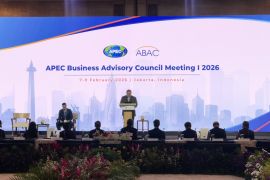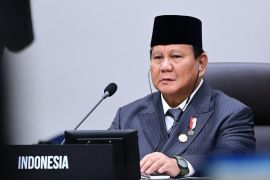However, with the emergence of climate change during the past years and the over exploitation of marine resources by the people, the sustainability of marine products are at risk and eventually the economy of countries owning the resources are also at risk too. Steps need to be taken to tackle this problem.
Driven by this concern, APEC leaders, in the Paracas Declaration they issued in Peru in 2010, have agreed to cooperate on four key issues. namely sustainable development and protection of the marine environment, tackle the impact of climate change on the ocean, promote free and open trade and investment and promote the role of oceans in securing food supply.
"Continuing its previous commitment to support the role of oceans in the economy, member countries of the APEC recently reaffirmed to give priority to marine conservation in an effort to sustain the environment as well as marine resources," Members of the Asia-Pacific Economic Cooperation (APEC) had recognized the importance of marine resources conservation for the economy, the chairman of APEC`s Marine Resources Conservation Working Group, Gelwynn Jusuf, said.
"The commitment to the ecosystem is reflected through APEC`s recent decision to merge its two working groups, namely the Marine Resource Conservation (MRC) and the Fisheries Cooperation with consideration to have better cooperation among member countries in both securing the environment and taking economic benefit from fisheries resources," Gelwynn said after attending a three-day joint meeting between the APEC`s MRC and Fisheries working group in Bali on June 6-9.
He said the merger was done because APEC members had realized that conservation of marine resources was needed to have sustainable resources for industry in the years ahead and also to improve the people`s standards of living, especially of people living in coastal areas.
Earlier, head of the research and development division of Indonesia`s Marine and Fisheries Ministry Endhay Kusnendar called on APEC member countries to make use of their marine resources in a sustainable manner while also trying to preserve the environment.
He said APEC had now become one of the prominent economic powers in the world with its member economies accounting for 57 percent of the global GDP and more than 40% of the world trade volume.
With a total population of more than 2.6 billion, he said, APEC itself had become a huge potential market. The consumption of global fish products in APEC economies had reached 70 percent, which comes from both captured and aquaculture production.
"Though the numbers look very promising, on the other hand, however, we are facing a major threat of ecosystem degradation due to excessive use of our resources which in return will jeopardize the sustainability of our oceans, and coastal resources," he said.
He said it was crucial for countries having marine resources to realize the full economic potential of their fisheries resources. "Economic sustainability depends not only on management of resource sustainability but that economic value added for economies from the use of such resources is fully enabled," he said.
Meanwhile, Chairman of Indonesian Fishery Product Processing and Marketing Association Thomas Darmawan stated it would be challenging for the government to convince traditional fishermen to support the effort to conserve the ocean and use pro-ecosystem approaches in capturing the fish.
"Big-level fishermen may support the government`s campaign towards marine conservation issue. But traditional fishermen who used to capture fish using simple tools may feel confuse or even oppose the green-idea because it is considered a factor that may hamper the fishermen to get fish," he said.
In dealing with such challenge, Thomas suggested the government to use local approach to engaged the traditional fishermen to support the marine conservation program. He also suggested the government to support traditional fishermen by giving subsidy to buy more sophisticated fishing tools for them. He took example, many traditional fishermen in Indonesia did not have cooler machine to carry captured fish in it.
"Our fishermen also need capacity building trainings too such as how to run sophisticated fishing tools or other useful fishing skills," he said.
APEC is the premier Asia-Pacific economic forum which goal to support sustainable economic growth and prosperity in the Asia-Pacific region.
The member countries are united to build a dynamic and harmonious Asia-Pacific community by championing free and open trade and investment, promoting and accelerating regional economic integration, encouraging economic and technical cooperation, enhancing human security, and facilitating a favorable and sustainable business environment.
APEC has 21 members namely Indonesia, Australia, Brunei Darussalam, Canada, Chile, China, Hong Kong, Japan, South Korea, Malaysia, Mexico, New Zealand, Papua New Guinea, Peru, the Philippines, Russia, Singapore, Chinese Taipei, Thailand, the United States and Vietnam.(*)
A051/HAJM/F001
Reporter: Amie Fenia Arimbi
Editor: Jafar M Sidik
Copyright © ANTARA 2011











